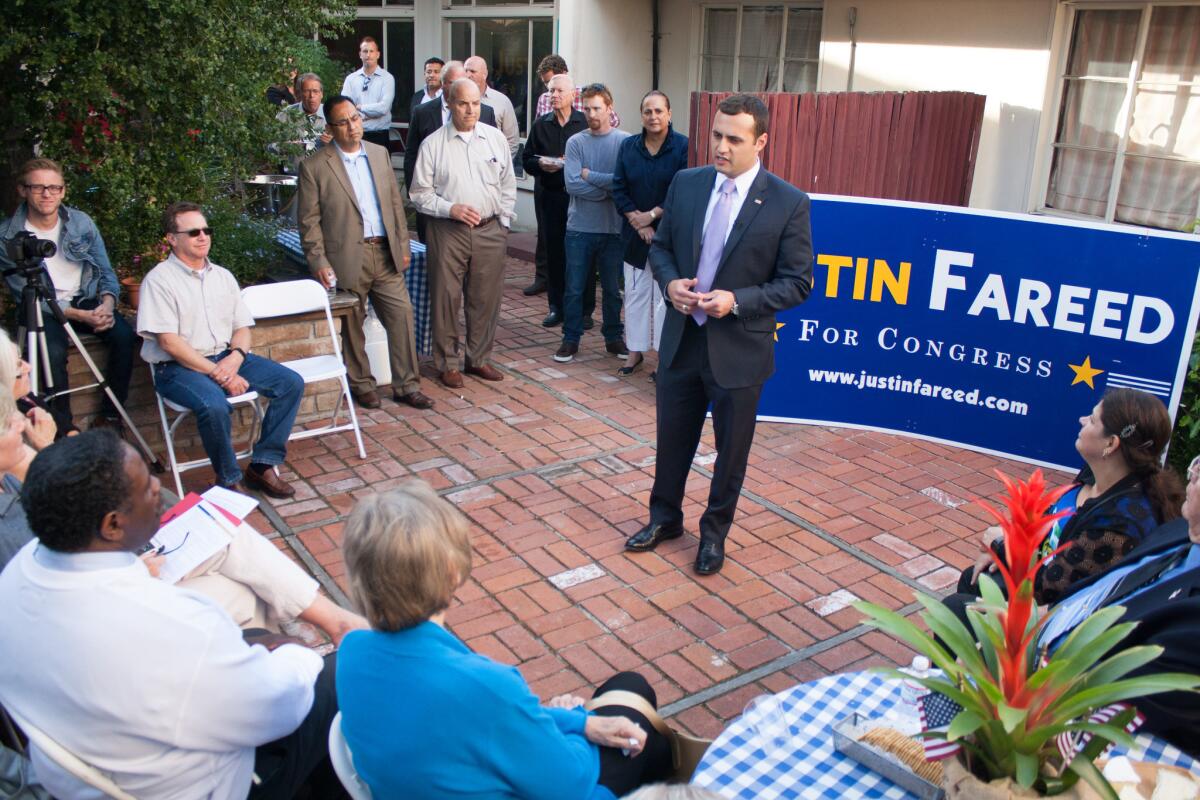How does a 28-year-old raise more than $1 million for a congressional bid?

In his first run for Congress two years ago, Justin Fareed, a relative newcomer to politics, relied mostly on his own money. He didn’t make it past the primary.
This year, the 28-year-old Republican, a former UCLA Bruins running back, has significantly more money to work with — $1 million.
Most of it — 80% — came from people living outside his Santa Barbara district. And nearly $200,000 has come from donors with ties to two of the state’s largest nursing home operators.
The businessmen, Lawrence Feigen and Shlomo Rechnitz, of L.A.’s Westside, have given the maximum allowed contributions, as have members of their families and their friends and employees.
Operators of skilled nursing facilities have a big stake in congressional decisions on healthcare funding and policy. Those businesses depend on funding from Medicaid and Medicare — and, in California, Medi-Cal – and they are under constant scrutiny by government regulators and inspectors.
Fareed himself is in the medical business; he is vice president of his family’s company, ProBand Sports Industries, which makes devices to treat tennis elbow and other repetitive stress injuries. In his candidate statement on the ballot, he also describes himself as a “third-generation cattle rancher” who understands “the burdensome taxes and regulations coming out of Washington, and the implications it has on small businesses and the agricultural community along the Central Coast.”
The congressional race in Santa Barbara, where Democratic Rep. Lois Capps is retiring, pits Fareed against Democratic Santa Barbara County Supervisor Salud Carbajal, who has raised $1.8 million. The field of five others includes Santa Barbara Mayor Helene Schneider, also a Democrat, and Republican Assemblyman K.H. “Katcho” Achadjian. The top two finishers in June will face off in November.
Feigen’s company SnF Management owns more than 35 long-term nursing facilities in California and Arizona under the name Windsor Healthcare.
Rechnitz owns more than 70 facilities and has been described as the state’s largest nursing home operator. In recent years, state and federal authorities have investigated his companies on charges including elder abuse and involuntary manslaughter.
Feigen and at least 30 of his employees, business associates, friends and family members have together contributed at least $108,000 to Fareed’s congressional campaign. Rechnitz, employees of his businesses and their family members have given at least $74,000.
Federal law caps direct donations to candidates at $2,700 for the primary and $2,700 for the general election.
Feigen donated the maximum amount to Fareed’s campaign. Rechnitz contributed $2,700. Three Feigen family members listed as students in finance disclosures each donated $2,700.
In addition, Feigen, his family’s trust and his company donated $25,000 to New Generation, a pro-Fareed political action committee that has since disbanded. Ramat Medical, where Rechnitz is chief financial officer, donated $10,000. Feigen and his wife also donated $10,000 to another PAC set up to support Fareed.
When asked about his donations, Feigen said he and his family “like people who are honest” and not part of the political establishment. He said he knew Fareed through business connections in the medical sector. Rechnitz, through a representative, declined to speak about his contributions to Fareed’s campaign beyond an emailed statement.
“Mr. Rechnitz is a major, non-denominational, non-partisan donor who last year alone contributed to more than 1,100 institutions,” Rechnitz’s spokesperson Stefan Friedman said in the statement.
At the recent opening of his campaign’s Santa Barbara headquarters, Fareed described Feigen as “a supporter like all of our other supporters for the campaign.”
Fundraising success
Fareed, a onetime Capitol Hill aide to a Kentucky congressman, ran for the Santa Barbara congressional seat in 2014, coming up a few hundred votes short of making it past the top-two primary to challenge Capps, the incumbent. That year, he raised about $190,000 and loaned his campaign $197,000.
Voter registration in the district, which stretches across San Luis Obispo, Santa Barbara and Ventura counties, is almost evenly split between Democrats and Republicans. President Obama won the district by 11 points in 2012, and tea party favorite Chris Mitchum, son of the late actor Robert Mitchum, came close to ousting Capps in 2014.
Around 56% of Fareed contributors this year live outside the district, and they contributed $875,000 of his $1.08 million in donations.
About 77% of the $1.5 million that Fareed’s opponent Carbajal has raised from individual donors comes from inside the Central Coast district.
At least 90 of Fareed’s 490 donors live in West Los Angeles, in the Hancock Park, Fairfax and Mid-Wilshire neighborhoods. Supporters in the 90036 ZIP Code contributed a combined $235,000 to the candidate — nearly 25% of the money Fareed brought in since the campaign began.
Many of those Westside donors have ties to the medical industry, according to donation records filed with the FEC.
Feigen is the co-founder of privately owned SnF Management, which manages a chain of nursing facilities. He is also the chief executive of a medical device company that sells orthotic insoles, according to his company website and LinkedIn page.
Rechnitz’s facilities brought in $62 million in profits in 2013, according to a Sacramento Bee report, citing state figures.
In August, California Atty. Gen. Kamala Harris filed involuntary manslaughter charges against one of Rechnitz’s nursing homes, and two of its employees were also charged with dependent adult abuse. Charges against one defendant were dismissed at a hearing last month after she agreed to testify in this case. The charges against the head of nursing and the nursing home remain, and the case is pending. At another Rechnitz-owned facility in Orange County, two former employees were charged with three counts each of elder abuse and failure to report abuse. Their trial is scheduled for July.
For the Record
5:50 p.m., June 2: An earlier version of this article said charges of dependent adult abuse against one defendant were dismissed at a hearing this month. The hearing was in May.
In addition, three Rechnitz-owned facilities repeatedly failed inspections and were eventually decertified by the U.S. Centers for Medicare and Medicaid Services, an agency spokesman said. Regulatory violations at facilities owned by Rechnitz have led to hundreds of thousands of dollars in fines. Rechnitz’s spokesman declined to comment on those cases but said the executive brought “59 nursing homes out of insolvency and currently provides life-saving care to thousands of Californians.”
‘A good guy’
West Hollywood resident Viktor Kogan and his wife each gave $2,700 to Fareed’s campaign in late October.
Asked recently about the contributions, Kogan said he could not recall donating to Fareed, adding that he had never heard of the candidate.
When shown a copy of a federal record noting his contribution, Kogan, 75, said his daughter, Ksenya Kogan, arranged the donation. She also contributed, and listed one of Feigen’s companies, SnF Management, as her employer.
Ksenya Kogan, an attorney, declined to comment about the donations except to say she had met Fareed through friends.
In nearby Hancock Park, Freda Stock gave a total of $5,400 to Fareed, but said she didn’t know anything about the candidate or his campaign. Stock said Feigen has done business with her husband and has been a family friend for “many, many years.”
Fareed’s campaign also has received donations from outside the state, including a $2,700 contribution from Chaim Feigen, a recent graduate of New York University who works for SnF Management and is registered to vote at Lawrence Feigen’s Los Angeles home. Asked about his contribution, he declined to comment.
Other donors interviewed by The Times said they had given money to Fareed’s campaign based on the advice of friends or business associates.
One of those is Denise Wilson, an executive at Ramat Medical, the West Los Angeles medical supply company where Rechnitz is chief executive. Wilson, who gave $2,700, said a group of people that she works with introduced her to Fareed’s campaign.
“They said that he was a good guy,” she said. “I couldn’t give you a definitive answer of his issues or what he stands for. They just said that he was a good, up-and-coming person to support our industry.”
SIGN UP for our free Essential Politics newsletter >>
Lawrence Feigen’s brother, Alan, who also works at Ramat Medical and gave $2,700, said he did not know Fareed personally. He said that a client, whom he declined to identify, had asked Ramat Medical employees to support the candidate.
Among other donors, Ken Zelden, a vice president at Harris Office Products in Van Nuys, said he gave Fareed’s campaign $2,700 because he’d “been told he is a good guy.” “I’m looking forward to meeting him,” he said.
At a recent campaign event in Santa Barbara, Fareed said donors from the healthcare industry comprise “a very prominent base of support that we are developing all over the place.”
He added that his campaign has been holding meet-and-greets and fundraisers around Southern California.
“When you are working to develop an organization, an infrastructure for a campaign and one as significant as this one, it takes a huge geographical area that’s incredibly diverse,” he said.
Times staff writers Victoria Kim, Sarah D. Wire and Maloy Moore contributed to this report.
ALSO:
Why activists in these California swing districts are feuding with the national Democratic Party
Celebrity donors pour money into this open California congressional seat
Updates on California politics
UPDATES:
June 3, 8:40 p.m.: This article was updated to reflect two additional donations.
4:28.p.m.: This article was updated to include San Luis Obispo County in the description of the 24th Congressional District’s boundaries.
This article was originally published June 2 at 12:56 p.m.
More to Read
Get the L.A. Times Politics newsletter
Deeply reported insights into legislation, politics and policy from Sacramento, Washington and beyond. In your inbox three times per week.
You may occasionally receive promotional content from the Los Angeles Times.











